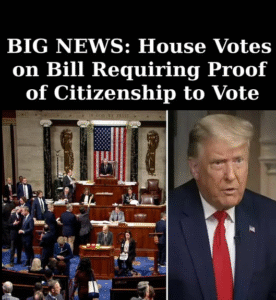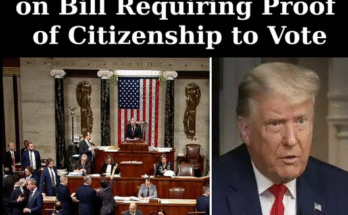On July 10, 2024, the U.S. House of Representatives passed the Safeguard American Voter Eligibility (SAVE) Act, a Republican-backed bill requiring individuals to provide documentary proof of U.S. citizenship when registering to vote in federal elections. The measure passed largely along party lines, with a vote of 221–198, as four Democrats joined Republicans in support.
Proponents argue that the legislation is necessary to prevent noncitizens from voting and to ensure the integrity of federal elections. Representative Chip Roy (R-TX), who introduced the bill, emphasized its importance in safeguarding American democracy. The bill aligns with former President Donald Trump’s agenda on election security.
However, opponents contend that the bill addresses a virtually nonexistent problem, as instances of noncitizen voting are exceedingly rare. Critics, including civil rights advocates and many Democrats, warn that the legislation could disenfranchise millions of eligible voters, particularly those who may have difficulty accessing the required documentation. A 2023 report from the Brennan Center for Justice estimated that approximately 9% of U.S. citizens of voting age, or about 21.3 million people, do not have proof of citizenship readily available.
The bill mandates that applicants present documents such as a valid U.S. passport, birth certificate, or naturalization papers to register to vote. It also requires states to verify their voter rolls for registered noncitizens. The legislation does not permit the use of Social Security numbers as proof of citizenship, which could pose challenges for individuals whose legal names differ from their birth certificates due to marriage or other reasons.
Historical precedents raise concerns about the potential impact of such requirements. In Kansas, a proof-of-citizenship law enacted in 2011 led to the suspension or cancellation of over 31,000 voter registrations of eligible citizens. The law was ultimately ruled unconstitutional in 2018, with the court citing the lack of evidence for significant noncitizen voting and the undue burden placed on legitimate voters.
The SAVE Act now moves to the Senate, where its future is uncertain. Although Republicans hold a majority, they lack the 60 votes needed to overcome a filibuster. President Joe Biden has indicated that he would veto the bill if it reaches his desk, arguing that it would not effectively safeguard elections and might instead make it harder for eligible Americans to register to vote.
The debate over the SAVE Act underscores the ongoing national discourse on election integrity and voter access. While supporters view the bill as a necessary measure to protect the electoral process, opponents see it as a solution in search of a problem that could disenfranchise vulnerable populations. As the legislation advances, it continues to provoke discussion about the balance between securing elections and ensuring broad voter participation.
